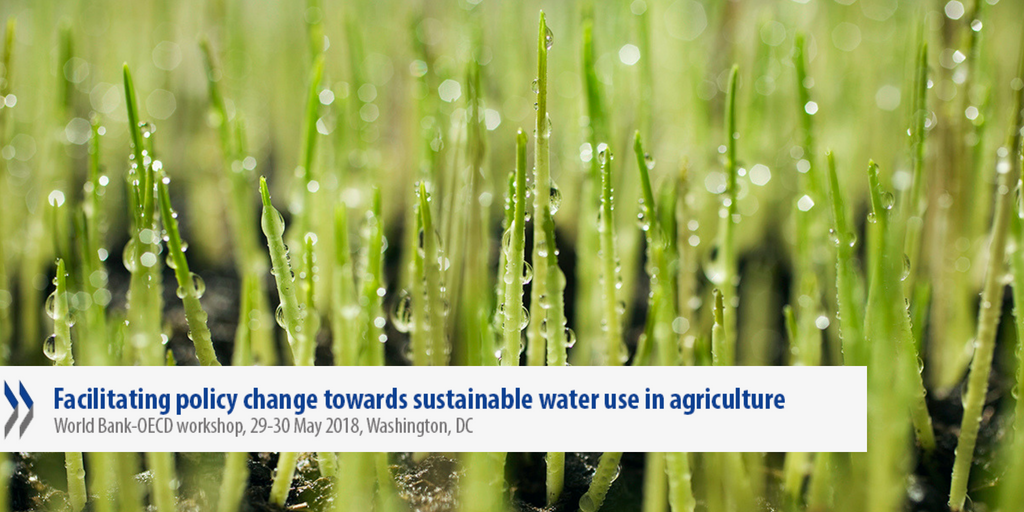Experts from high-income countries and client countries came together last week during a joint World Bank-OECD workshop to discuss the shared goal of improving policy design and implementation for water use in agriculture. Although efficient use of water is becoming a central aim of agricultural practices, much work is yet to be done to meet steep water demands and curtail pollution from agricultural production. 
Facilitating Policy Change Towards Sustainable Water Use in Agriculture brought together staff from the World Bank and the Organisation for Economic Co-operation and Development (OECD), in addition to representatives from the European Commission, the International Water Management Institute (IWMI), various government agencies and offices of World Bank supported projects. The workshop panels and discussions focused on better understanding policy options to tackle complex challenges facing the water and agriculture space.
Guangzhe Chen, Senior Director of the World Bank’s Water Global Practice, outlined the key challenges facing the water and agriculture interface in his opening remarks: decreasing per capita water availability, increasing water pollution due to current methods of agriculture production, and increasing variability of water supplies due to climate change. “These challenges will continue and intensify unless additional meaningful action is taken worldwide, including improving agriculture and water policies. This is a core theme underlying this workshop,” said Chen.
Chen also asserted that agriculture water quality and quantity challenges are increasingly important in both developing and developed countries. He continued by emphasizing that conversations around water use in agriculture need to extend beyond technology and management.
As such, the workshop aimed to develop recommendations on how to achieve positive policy change – in order to achieve more sustainable use and management of water in the agricultural sector. The workshop covered a rare mix of research results alongside practical experiences. Given the difficulty of designing, developing, and implementing effective policy reform, the sessions and discussions focused on cross-pollinating ideas to come up with shared recommendations.
“This workshop comes from the observation that policy changes in the area are not always easy to implement, to put together, and to introduce – and the question is, why is that?” said Guillaume Gruère, Senior Policy Analyst for the Trade and Agriculture Directorate of the OECD. He continued by explaining that there are a lot of options you can investigate if you look at issues from the outside. There is the question of water allocation – who are the priority users? There is the public good dimension – how can we change policies that don’t seem to work? And there are regulation issues across the board.
“Discussion and dialogue are really bringing something out that I can’t get when I read papers in my little office in Paris. And that is what is interesting, these collective action efforts, to discuss their perspective and change - that is how we can make sense about what to do,” said Gruère.
In line with this, the workshop focused on policy measures that have proven challenging to design, adopt and implement. Each session included presentations followed by a moderated discussion. The sessions focused on the following themes:
- Session 1: Core drivers to changing agricultural and water policies
- Session 2: Effective water conservation under scarcity
- Session 3: Regulation of groundwater irrigation in areas facing depletion
- Session 4: Pathways to reduce water-harmful subsidies in agriculture
- Session 5: Water charges in agriculture
- Session 6: Regulations for nonpoint source pollution
The following presentations ranged from diving into New Zealand’s experience with mitigating nonpoint source pollution to reviewing how Jordan dealt with over-pumping groundwater. The speakers discussed how to better integrate the sustainable use and management of water in agricultural and water policies. This includes measures to optimize water harvesting, water and soil conservation, ground water management, and water allocation systems – in addition to watershed-scale approaches that recognize the multiple uses of water and integrate good farming practices with effective land-use planning.
At the end of the workshop, Jennifer Sara, Director for the World Bank Group’s Water Global Practice, focused on how the presentations and discussions can facilitate World Bank Group operations. “Everything that is being discussed today is directly operationally relevant to the work we are doing across the world,” said Sara, emphasizing the importance of knowledge exchange.
Overall, the workshop strived to identify pathways to address water resource challenges for the agriculture sector. All participants demonstrated a commitment to approaches that improve the sustainability of water use in agricultural production, while also ensuring food security. To ensure a water-secure world for all, it is imperative to ensure that water is protected, used, and managed sustainably in the agricultural space.


Join the Conversation